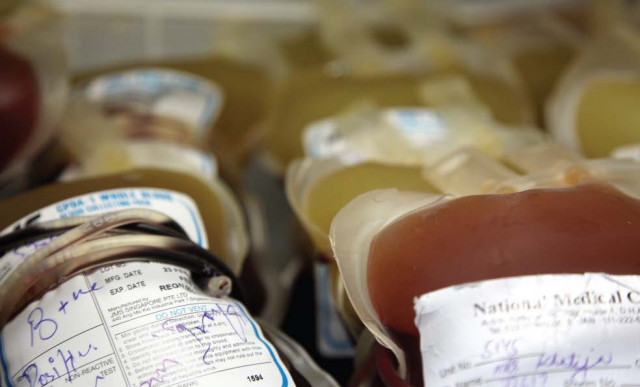Blood transfusion: Voluntary donations and a blood database needed
‘Only around 10% of donors in Pakistan are voluntary’.

All over the world it is the voluntary donors who keep blood-transfusion departments stocked up for the next emergency. But in Pakistan around 80 per cent are family donors, according to Dr Saeed Ahmed, a consultant at Husaini Blood Bank.
However, in Pakistan, voluntary donation is still a novel concept. Ahmed said that only about 10 per cent of the donors at Husaini were voluntary. The rest 10 per cent were ‘professional’ donors who sold their blood mostly so that they can get drugs.
Voluntary blood donation is also preferable for blood banks because only healthy people donate blood. Usually when relatives donated blood in case of emergencies it increases the chances of the patient receiving unhealthy blood.
Ahmed said that about 3.6 million units of blood were needed in a year while they received between 2.2 and 2.4 million units. “This is because the government has not put in place any mechanism to collect blood.”
Blood screening was another problem altogether, said Dr Saqib Ansari of National Institute of Blood Diseases. “In UK the health-care professionals ask every detail about people’s lives, including any private or dirty habits,” he said. “But here the hemoglobin (Hb) of the blood donor is not checked anywhere.” For donating blood, a man’s Hb must be above 12.5, while a woman’s must be 12. “Taking blood from people with the below minimum Hb level will risk the lives of the patient and the donor both.” If the blood is screened properly then around 50 per cent diseases will be reduced, like in the UK.
According to Ahsan, an employee of a private blood bank, most of the places which were illegal did not have proper equipment. A lot of blood also went to waste because of load shedding. The Sindh Blood Transfusion Authority (SBTA) has shut down at least 128 illegal blood banks in the province. However, the authority’s role does seem to be appreciated much. “The SBTA does not collect any data on blood groups and their prevalence,” said a doctor. “The patients have to turn to private blood banks and hospitals.”
The doctors suggest adding the person’s blood group on the identity card. They also say that the government should set up a blood database by the rate of their prevalence.
Published in The Express Tribune, May 12th, 2012.



















COMMENTS
Comments are moderated and generally will be posted if they are on-topic and not abusive.
For more information, please see our Comments FAQ